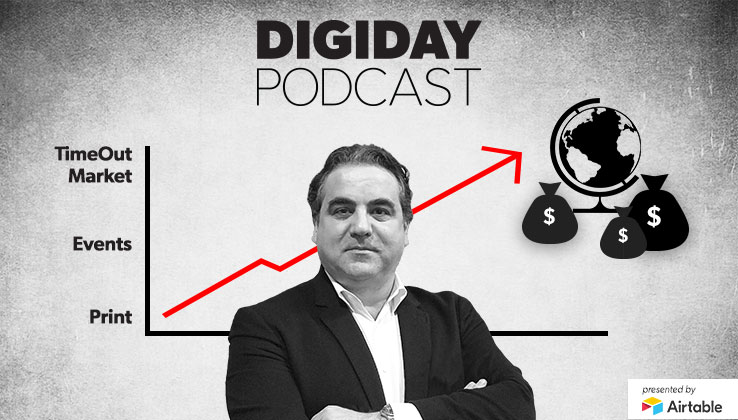Secure your place at the Digiday Media Buying Summit in Nashville, March 2-4
Digiday Podcast: Time Out CEO Julio Bruno on making commerce core to a media model

Subscribe: iTunes | Google Play | Stitcher | Anchor
When CEO Julio Bruno joined Time Out three years ago, it was a publishing guide for cities. Today, the company has diversified into commerce, events and operating branded food markets. Last year, the group drove 700,ooo transactions, from restaurant reservations to tour bookings, and put on 250 live events.
“You cannot just look at Google and Facebook because Amazon is coming on strong,” said Bruno on the Digiday Podcast. “Everything that Amazon touches, they revolutionize. This is the world of competition. [Amazon] collaborates with you; they allow you to sell your stuff, but they also compete with you. They sell tickets now. They’re trying, testing and seeing — if there’s [an opportunity] here, they will take the whole thing.”
Bruno discussed Time Out’s revenue streams, the publisher’s plan to reach profitability, the case for continuing print editions and more in the episode.
Edited highlights appear below.
Monetizing content
“Time Out has always told you what to do in cities. What you had to do is Google, find it, match it and book it — not a great user experience today. If you recommend something to people, why don’t you let them buy it? Going direct is very expensive, so we decided to go through affiliates and sell tickets to the things we’re recommending.”
Time Out Market
“Publishers today talk about diversifying revenue, but [e-commerce] is only 2 percent [of their business]. With the duopoly and now Amazon coming as well, I could see it was not enough for our global brand. I created two divisions. One is Time Out Digital, which has print, digital and e-commerce. The other is Time Out Market, which is the physical representation and curation of Time Out. We opened a market in Lisbon [in Portugal]. There are several bars, restaurants and shops. They are the best in the city chosen by the editorial team. We are now opening in Miami, Chicago and other cities.”
Print is still important
“Print is still very important for us. The magazines are free around the world. Last year, print advertising was around 38 percent of the company revenue. We grew by 1 percent. The way we now look at Time Out is that we’re agnostic about how we deliver the content, through web, magazine, the app and social channels.”
Approach to profitability
“Time Out is not yet profitable as a company. We realized that we couldn’t rely on advertising. We do e-commerce and listings that restaurants can buy subscriptions for. Last year, e-commerce grew 57 percent year over year. [We drive] over 700,000 transactions; we’ve grown from 160,000 two and a half years ago. Incremental won’t do it for us. Last year, we did over 250 events. We grew by 49 percent in our premium listings business.”
The ‘ship has sailed’ on video
“Video is something that enhances the digital platforms. People like to get visuals. If you want to become that, the ship has sailed. You have to be true to who you are and use video for things you can add to. We use video as a nice way to present content. As a strategy for getting more money, it won’t make much impact.”
More in Media

From feeds to streets: How mega influencer Haley Baylee is diversifying beyond platform algorithms
Kalil is partnering with LinkNYC to take her social media content into the real world and the streets of NYC.

‘A brand trip’: How the creator economy showed up at this year’s Super Bowl
Super Bowl 2026 had more on-the-ground brand activations and creator participation than ever, showcasing how it’s become a massive IRL moment for the creator economy.

Media Briefing: Turning scraped content into paid assets — Amazon and Microsoft build AI marketplaces
Amazon plans an AI content marketplace to join Microsoft’s efforts and pay publishers — but it relies on AI com stop scraping for free.





